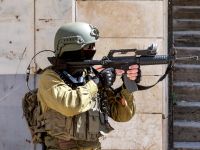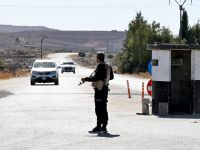U.S. President Bush mourned the deaths of five Americans in a Jerusalem bombing as he met Thursday with King Abdullah of Jordan on how to move the Mideast peace process forward.
"I am just as angry as Israel is. I am furious," he said. "But even though I am mad, I still think peace is possible," the president said at a picture-taking session with the king at the start of a meeting in the Oval Office.
According to AP, Bush said he was seeking the cooperation of Arab governments in tracking down the perpetrators of the bombing at Hebrew University in which five Americans were killed. At the same time, the president reaffirmed that bolstering security is his highest priority. Bush said security arrangements must serve to protect people and not the "whims" of one man.
Later, Bush was due to meet with Israeli Foreign Minister Shimon Peres, joining a meeting Peres was set to hold with Condoleezza Rice, the president's national security assistant.
"Today we mourn the loss of American lives," Bush said at the outset of his meeting with the king. He said the “terrorists” were guided by "some kind of false religion" and were trying to kill off peace hopes. "We are committed to the war on terror, to fighting the war on terror, to winning the war on terror," he said. And yet, Bush said the foes of peace should not be permitted to stop the peace process.
Abdullah, in response, praised Bush's "very strong commitment" to aid the Palestinian people. And the monarch stated Arabs and Israelis must move together to broaden that peace throughout the region. "You have really given us hope that once and for all we will be able to move forward as Arabs and Israelis to be able to live in peace and harmony and have a tremendous future," Abdullah said.
On another front, Iraq, the leaders’ disagreement was apparent. Bush indicated he was unswayed by arguments against using force against Iraq, saying at the meeting with Abdullah he was determined to review all options for ousting Iraqi President Saddam Hussein.
Bush said he had discussed with the king the issue before and "I haven't changed my mind." Lashing out at Saddam as a poisoner of his own people, bent on acquiring weapons of mass destruction, Bush said "the policy of our government, this administration, is regime change." He said he would "assure his majesty that we are looking at all options."
Abdullah was quoted in a Washington Post interview as saying it would be a "tremendous mistake" for the United States to ignore warnings against a military campaign to drive out Saddam.
Arafat
Earlier in the day, Palestinian leader Yasser Arafat has warned that the Palestinian elections due in January would be postponed if Israel continues to occupy Palestinian autonomous territories. "The elections can be postponed in the event of one thing only: if the occupation persists, as they cannot be held under the occupation," Arafat said in an interview with the London-based Asharq al-Awsat daily.
"How can elections be held in the presence of the Israeli army? Then, they would cheat and (the elections) would not be free," he said. Arafat said he "will insist" on the presence of foreign independent observers to monitor the upcoming polls, "like in the first elections (1996) which were held under the supervision of 2,000 international observers."
Asked about who might eventually succeed him, Arafat commented the constitution stipulates that Abu Mazen, secretary general of the Palestine Liberation Organization's executive committee, would replace him at the head of the PLO. Ahmed Qorei, the Palestinian Legislative Council's (PLC) speaker, would head the Palestinian Authority for 60 days during which presidential elections would be held, he added. (Albawaba.com)
© 2002 Al Bawaba (www.albawaba.com)







